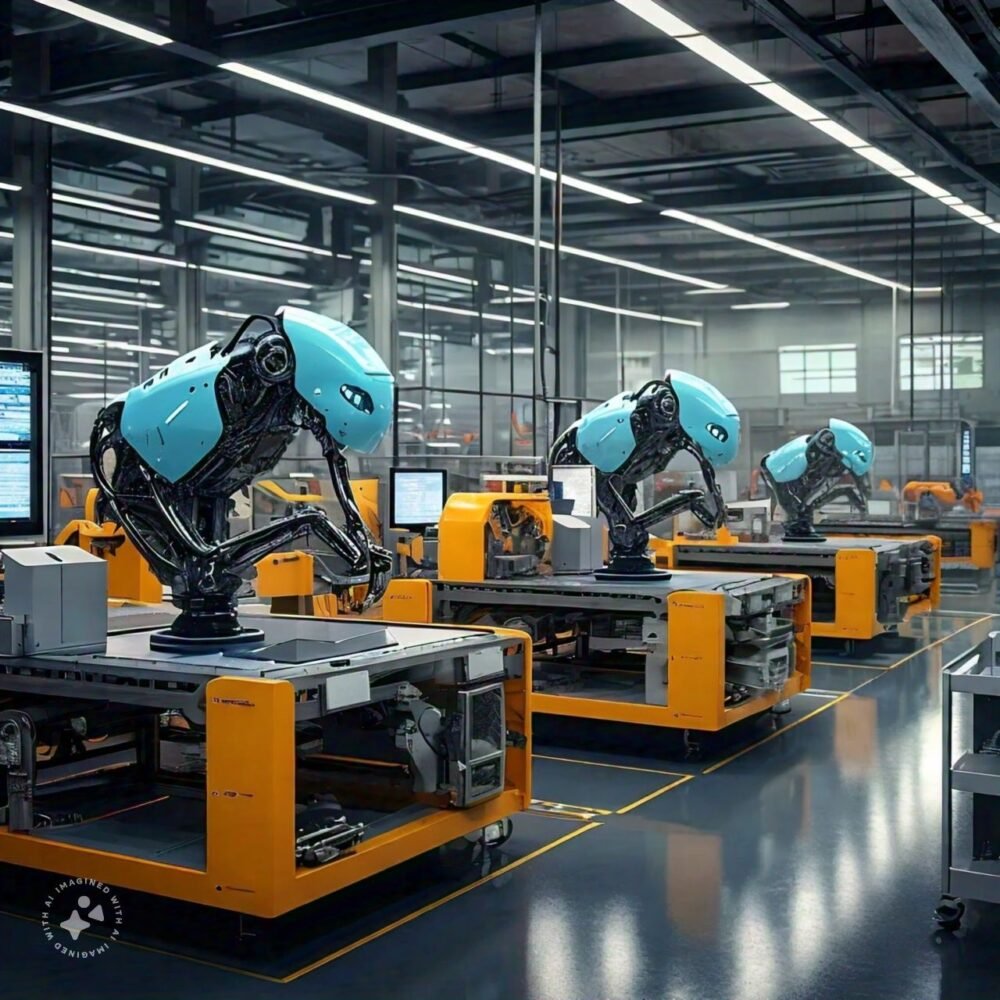Artificial Intelligence (AI) has increasingly become a cornerstone of innovation and efficiency across various industries, and the manufacturing sector is no exception. The integration of AI in manufacturing is transforming the landscape by enhancing productivity, reducing costs, and promoting a more agile and adaptive production environment. This article explores the multifaceted role of AI in the manufacturing industry, diving into its applications, benefits, and the challenges it faces.

Applications of AI in Manufacturing
1. Predictive Maintenance: One of the most significant applications of AI in manufacturing is predictive maintenance. AI algorithms analyze data from various sensors embedded in machinery to predict when a machine is likely to fail. By forecasting equipment breakdowns before they occur, manufacturers can schedule maintenance during non-peak times, thereby minimizing downtime and extending the lifespan of machinery.
2. Quality Control: AI systems are employed to enhance quality control processes. Computer vision, a subset of AI, can detect defects in products with higher accuracy and speed than human inspectors. These systems use deep learning models trained on vast datasets of images to identify inconsistencies and imperfections, ensuring that only products meeting high-quality standards proceed to the market.
3. Supply Chain Optimization: AI aids in optimizing supply chains by predicting demand, managing inventory, and identifying the most efficient logistics routes. Machine learning algorithms analyze historical data and current market trends to forecast future demand, helping manufacturers maintain optimal inventory levels. This reduces both overstock and stockouts, improving overall efficiency.
4. Robotics and Automation: AI-powered robots, known as cobots (collaborative robots), work alongside human workers to enhance productivity. These robots can handle repetitive and dangerous tasks, reducing the risk of injury and allowing human workers to focus on more complex duties. AI enhances the functionality of these robots, enabling them to learn from their environment and adapt to new tasks without extensive reprogramming.
5. Design and Prototyping: AI accelerates the design and prototyping phase through generative design algorithms. These algorithms can generate multiple design alternatives based on specific constraints and requirements. Engineers and designers can then evaluate these options to choose the most efficient and innovative designs, reducing the time and cost associated with the prototyping process.
Benefits of AI in Manufacturing
1. Increased Efficiency: AI streamlines various manufacturing processes, leading to significant gains in efficiency. Predictive maintenance minimizes unexpected downtime, quality control automation reduces waste, and supply chain optimization ensures timely delivery of materials and products. Together, these improvements result in a more efficient production cycle.
2. Cost Reduction: By optimizing maintenance schedules, reducing waste, and improving supply chain management, AI helps manufacturers cut costs. Automated quality control and defect detection prevent defective products from reaching the market, saving costs associated with returns and recalls. Moreover, AI-driven robotics enhance productivity without the need for significant increases in labor costs.
3. Enhanced Product Quality: The precision and consistency offered by AI systems lead to higher product quality. Automated inspections and continuous monitoring ensure that products meet strict quality standards, enhancing customer satisfaction and reducing the likelihood of costly product recalls.
4. Flexibility and Adaptability: AI enables manufacturers to respond quickly to changing market demands. Machine learning models can analyze trends and predict shifts in consumer preferences, allowing manufacturers to adjust their production strategies accordingly. This flexibility is crucial in a dynamic market environment where the ability to pivot quickly can be a competitive advantage.
5. Safety Improvements: AI contributes to a safer working environment by taking over hazardous tasks and monitoring conditions in real-time. Predictive maintenance not only prevents equipment failures but also reduces the risk of accidents. Additionally, AI-driven robotics can handle dangerous materials and tasks, minimizing the risk to human workers.
Challenges and Considerations
1. Implementation Costs: Despite the numerous benefits, the initial cost of implementing AI systems can be high. Small and medium-sized manufacturers may find it challenging to invest in the necessary technology and infrastructure. However, as AI technology becomes more widespread, costs are expected to decrease, making it more accessible.
2. Skill Requirements: The adoption of AI in manufacturing necessitates a workforce with specialized skills. Employees must be trained to work with AI systems, interpret data, and maintain advanced machinery. This demand for skilled labor can be a barrier for companies, highlighting the need for investment in training and education.
3. Data Security: AI systems rely on vast amounts of data, which raises concerns about data security and privacy. Manufacturers must ensure that their data is protected from cyber threats and breaches. Robust cybersecurity measures are essential to safeguard sensitive information and maintain trust.
4. Integration with Existing Systems: Integrating AI with legacy systems can be complex and time-consuming. Manufacturers must carefully plan the integration process to ensure compatibility and minimize disruptions to existing operations. This often requires significant modifications and upgrades to current systems.
5. Ethical and Regulatory Issues: The use of AI raises ethical and regulatory concerns, particularly related to job displacement and decision-making transparency. Manufacturers must address these issues by ensuring fair labor practices and maintaining transparency in AI-driven decisions. Regulatory bodies are also increasingly focusing on the ethical implications of AI, necessitating compliance with emerging standards and regulations.
Future Prospects
The future of AI in manufacturing is promising, with ongoing advancements set to drive further innovation and efficiency. Emerging technologies such as the Internet of Things (IoT), 5G connectivity, and advanced robotics will synergize with AI to create smarter, more autonomous manufacturing environments. Additionally, the development of more sophisticated AI models and algorithms will enable manufacturers to tackle even more complex challenges, paving the way for a new era of industrial innovation.
Conclusion
AI is revolutionizing the manufacturing industry by enhancing efficiency, reducing costs, and improving product quality. Its applications in predictive maintenance, quality control, supply chain optimization, robotics, and design are transforming traditional manufacturing processes. Despite challenges such as implementation costs, skill requirements, and data security concerns, the benefits of AI in manufacturing are substantial. As technology continues to evolve, the integration of AI will become increasingly vital, driving the industry towards greater innovation and competitiveness.




Leave a Reply